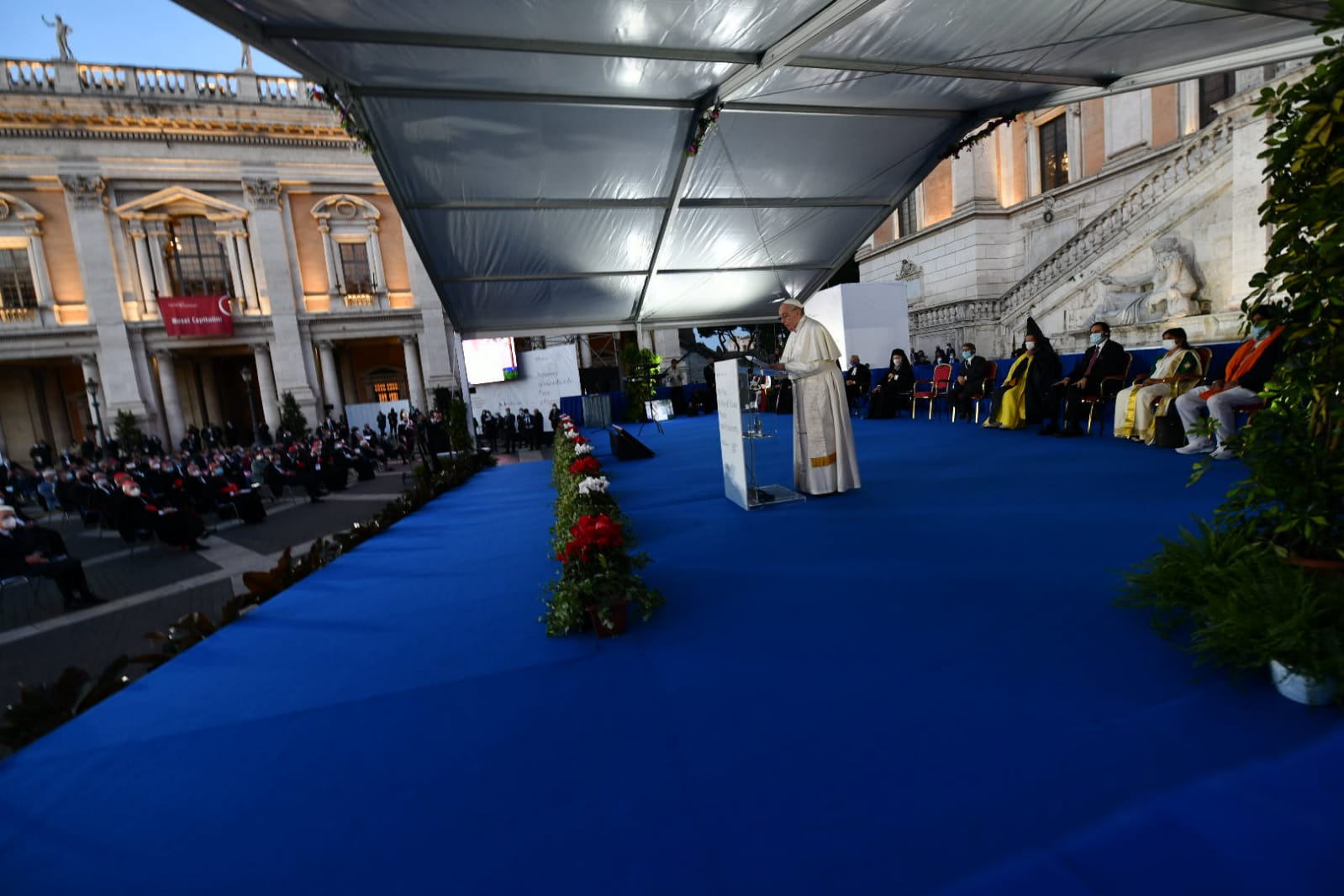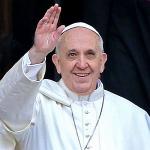Dear Brothers and Sisters,
I rejoice and give thanks to God that here on the Capitoline Hill, in the heart of Rome, I can meet with you, distinguished religious leaders, public authorities and so many friends of peace. At each other's side, we have prayed for peace. I greet the President of the Italian Republic, the Honourable Sergio Mattarella. I am happy to encounter once more the Ecumenical Patriarch, His Holiness Bartholomew. I am most grateful that, despite the difficulties of travel these days, he and other leaders wished to take part in this prayer meeting. In the spirit of the Assisi Meeting called by Saint John Paul II in 1986, the Community of Sant'Egidio celebrates annually, in different cities, this moment of prayer and dialogue for peace among believers of various religions.
The Assisi Meeting and its vision of peace contained a prophetic seed that by God's grace has gradually matured through unprecedented encounters, acts of peacemaking and fresh initiatives of fraternity. Although the intervening years have witnessed painful events, including conflicts, terrorism and radicalism, at times in the name of religion, we must also acknowledge the fruitful steps undertaken in the dialogue between the religions. This is a sign of hope that encourages us to continue cooperating as brothers and sisters. In this way, we arrived at the important Document on Human Fraternity for World Peace and Living Together, which I signed with the Grand Imam of Al-Azhar, Ahmad Al-Tayyeb, in 2019.
Indeed, "the commandment of peace is inscribed in the depths of the religious traditions" (Fratelli Tutti, 284). Believers have understood that religious differences do not justify indifference or enmity. Rather, on the basis of our religious faith we are enabled to become peacemakers, rather than standing passively before the evil of war and hatred. Religions stand at the service of peace and fraternity. For this reason, our present gathering also represents an incentive to religious leaders and to all believers to pray fervently for peace, never resigned to war, but working with the gentle strength of faith to end conflicts.
We need peace! More peace! "We cannot remain indifferent. Today the world has a profound thirst for peace. In many countries, people are suffering due to wars which, though often forgotten, are always the cause of suffering and poverty" (Address to Participants in the World Day of Prayer for Peace, Assisi, 20 January 2016). The world, political life and public opinion all run the risk of growing inured to the evil of war, as if it were simply a part of human history. "Let us not remain mired in theoretical discussions, but touch the wounded flesh of the victims… Let us think of the refugees and displaced, those who suffered the effects of atomic radiation or chemical attacks, the mothers who lost their children, and the boys and girls maimed or deprived of their childhood" (Fratelli Tutti, 261). Today the sufferings of war are aggravated by the suffering caused by the coronavirus and the impossibility, in many countries, of access to necessary care.
In the meantime, conflicts continue, bringing in their wake suffering and death. To put an end to war is a solemn duty before God incumbent on all those holding political responsibilities. Peace is the priority of all politics. God will ask an accounting of those who failed to seek peace, or who fomented tensions and conflicts. He will call them to account for all the days, months and years of war endured by the world's peoples!
The words Jesus spoke to Peter are incisive and full of wisdom: "Put your sword back into its place; for all who take the sword will perish by the sword" (Mt 26:52). Those who wield the sword, possibly in the belief that it will resolve difficult situations quickly, will know in their own lives, the lives of their loved ones and the lives of their countries, the death brought by the sword. "Enough!" says Jesus (Lk 22:38), when his disciples produce two swords before the Passion. "Enough!" That is his unambiguous response to any form of violence. That single word of Jesus echoes through the centuries and reaches us forcefully in our own time: enough of swords, weapons, violence and war! Saint Paul VI echoed that word in his appeal to the United Nations in 1965: "No more war!" This is our plea, and that of all men and women of good will. It is the dream of all who strive and work for peace in the realization that "every war leaves our world worse than it was before" (Fratelli Tutti, 261).
How do we find a way out of intransigent and festering conflicts? How do we untangle the knots of so many armed struggles? How do we prevent conflicts? How do we inspire thoughts of peace in warlords and those who rely on the strength of arms? No people, no social group, can singlehandedly achieve peace, prosperity, security and happiness. None. The lesson learned from the recent pandemic, if we wish to be honest, is "the awareness that we are a global community, all in the same boat, where one person's problems are the problems of all. Once more we realized that no one is saved alone; we can only be saved together" (Fratelli Tutti, 32). Fraternity, born of the realization that we are a single human family, must penetrate the life of peoples, communities, government leaders and international assemblies. This will help everyone to understand that we can only be saved together through encounter and negotiation, setting aside our conflicts and pursuing reconciliation, moderating the language of politics and propaganda, and developing true paths of peace (cf. Fratelli Tutti, 231).
We have gathered this evening, as persons of different religious traditions, in order to send a message of peace. To show clearly that the religions do not want war and, indeed, disown those who would enshrine violence. That they ask everyone to pray for reconciliation and to strive to enable fraternity to pave new paths of hope. For indeed, with God's help, it will be possible to build a world of peace, and thus to be saved together.

